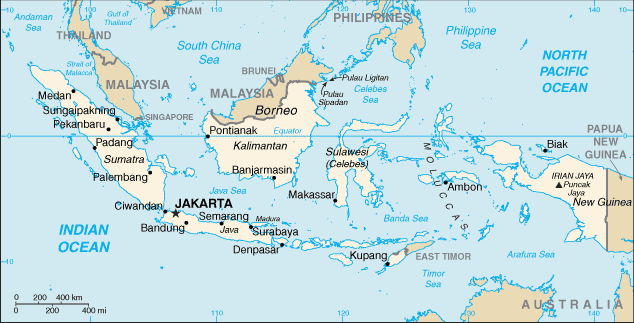| Indonesia |
|
|
 |
|
| Geography | |
| Location: | South-eastern Asia, archipelago between the Indian Ocean and the Pacific Ocean. |
| Area: | total:
1,919,440 sq km land: 1,826,440 sq km water: 93,000 sq km |
| Natural Resources: | petroleum, tin, natural gas, nickel, timber, bauxite, copper, fertile soils, coal, gold, silver |
| Population and Health | |
| Population: | 253,609,643 (July 2014 est.) |
| Age structure: | 0-14 years: 26.2% (male 33,854,520/female 32,648,568) |
| Population growth rate: | 0.95% (2014 est.) |
| Birth rate: | 17.04 births/1,000 population (2014 est.) |
| Death rate: | 6.34 deaths/1,000 population (2014 est.) |
| Sex ratio: | at birth: 1.05 male(s)/female |
| Infant mortality rate: | total: 25.16 deaths/1,000 live births |
| Life expectancy at birth: | total population: 72.17 years |
| Total fertility rate: | 2.18 children born/woman (2014 est.) |
| Current contraceptive use among married women 15-49 years old(any method): | 61% (2007-2012) |
Unmet need of contraceptive: |
11.4% (2012) |
HIV/AIDS - people living with HIV/AIDS: |
605,500 (2012) |
| HIV/AIDS - deaths: | 26,800 (2012) |
| Literacy: | definition: age 15 and over can read and write |
| Economy | |
| GDP (purchasing power parity): | $1.285 trillion (2013 est.) |
| GDP (official exchange rate): | $867.5 billion (2013 est.) |
| GDP - real growth rate: | 5.3% (2013 est.) |
| GDP - per capita (PPP): | $5,200 (2013 est.) |
| GDP - composition by sector: | agriculture:
15.3% industry: 47.6% services: 37.1% (2009 est.) |
| Labor force - by occupation: | agriculture: 14.3% |
| Population below poverty line: | 11.7% (2012 est.) |
| Inflation rate (consumer prices): | 7.7% (2013 est.) |
| Agriculture - products: | rubber and similar products, palm oil, poultry, beef, forest products, shrimp, cocoa, coffee, medicinal herbs, essential oil, fish and its similar products, and spices |
| Industries: | Petroleum and natural gas, textiles, apparel, footwear, mining, cement, chemical fertilizers, plywood, rubber, food, tourism |
| Industrial production growth rate: | 4.3% (2013 est.) |
| Exports - commodities: | oil and gas, electrical appliances, plywood, textiles, rubber |
| Currency (code): | Indonesian rupiah (IDR) |
| Others | |
| Nationality: | noun:
Indonesian(s) adjective: Indonesian |
| Religions: |
Muslim
: 87 % Protestant : 6 % Roman Catholic : 3 % Hindu : 2 % Buddhist : 1 % Others : 1 % (2005) |
| Languages: |
Bahasa Indonesia (official, modified form of Malay), English, Dutch, local dialects (the most widely spoken of which is Javanese) |
| Country name: | conventional
long form: Republic of Indonesia conventional short form: Indonesia former: Netherlands East Indies; Dutch East Indies |
| Government type: | republic |
| Capital: | name:
Jakarta geographic coordinates: 6 10 S, 106 48 E time difference: UTC+7 (12 hours ahead of Washington, DC during Standard Time) note: Indonesia is divided into three time zones |
| Administrative divisions: | 30
provinces (propinsi-propinsi, singular - propinsi), 2 special regions* (daerah-daerah
istimewa, singular - daerah istimewa), and 1 special capital city district**
(daerah khusus ibukota); Aceh*, Bali, Banten, Bengkulu, Gorontalo, Irian
Jaya Barat, Jakarta Raya**, Jambi, Jawa Barat, Jawa Tengah, Jawa Timur,
Kalimantan Barat, Kalimantan Selatan, Kalimantan Tengah, Kalimantan Timur,
Kepulauan Bangka Belitung, Kepulauan Riau, Lampung, Maluku, Maluku Utara,
Nusa Tenggara Barat, Nusa Tenggara Timur, Papua, Riau, Sulawesi Barat, Sulawesi
Selatan, Sulawesi Tengah, Sulawesi Tenggara, Sulawesi Utara, Sumatera Barat,
Sumatera Selatan, Sumatera Utara, Yogyakarta* note: following the implementation of decentralization beginning on 1 January 2001, the 440 districts or regencies have become the key administrative units responsible for providing most government services |
| Independence: | 17 August 1945 (independence declared); 27 December 1949 (recognized by the Netherlands) |
| Legal system: | based on Roman-Dutch law, substantially modified by indigenous concepts and by new criminal procedures and election codes; has not accepted compulsory ICJ jurisdiction |
|
|
|
| Source : UN_Demographic and Health Surveys (DHS), Multiple Indicator Cluster Surveys (MICS) and other national surveys; United Nations Population Division Update date: August 2014
|
|